| Owen K. Collins |
My father, Owen Kitchens Collins, Sr. was born on February 28, 1915 in Dublin, Georgia. He grew up in Decatur, Georgia, graduating from Decatur Boys High in 1933. In 1936 he married Virginia Rogers and in 1942 their first child was born. Dad was inducted into the United States Army on November 23, 1943 at Ft. McPherson, Georgia. He trained at Ft. Shelby and remained there until he was shipped overseas in July 1944. He served in the 3rd Army, 30th Infantry Regiment, 3rd Division, Company L.
On August 14, 1944 Dad landed on Red Beach. Over the next four months he advanced through France and on December 18, 1944 was near Kaysersberg. Company L had cleared its sector of Kaysersberg and was ordered to join the 1st Battalion and reinforce its west flank. Battles on the 19th moved the German troops back and Kaysersberg was entered at 1100. The enemy was in position for a counter attack, but at daybreak on December 20th, the 30th Division shattered this counterattack before it began.
Dad was not to be part of that battle. He was captured shortly before dawn on December 20. After his capture he was passed back through the German lines, he was held for a short time at Villingen and then loaded on a boxcar and sent to Stalag VII A in Moosburg. Conditions on the train were horrible. There was only room for half of the men to sit at a time, so the men that were strong enough took turns sitting while others stood. They were given a small piece of cheese to eat. Most of the men had dysentery. There was no water except the icicles that they were able to break off.
Our mother said that Dad talked "non-stop" after returning home until he told her told her everything that happened during the war. Then he stopped talking and rarely said anything about his wartime experiences. He never told his children of the filth and the misery he and his fellow prisoners endured at Stalag VII A. The few times he did tell "war stories," he had nightmares for several nights.
Dad did tell us about potatoes and a stove he and his friends had built from scavenged material. He went outside of the camp on work details cleaning out bombed buildings. He sewed pockets inside his overcoat and while working, he and his buddies hid potatoes from the cellars of these buildings in his coat. Upon returning to camp, he watched the pattern of searches and got in line so that he would not be searched. Once he made it past the guards at the gate, he and his friends were able to cook their potatoes on their stove. If they needed to, they bribed their guards with cigarettes from their Red Cross packages. After he came home, Dad never again ate potatoes.
He also told us about a small pocket knife he had smuggled into the camp. The knife was another prized possession of my dad and the men in his barracks. It was used to assemble the stove and for other task that required a knife.
My brother, now 68, still has a ring that Dad made for him while at Stalag VII A. He made the ring from a coin by beating the side of the coin with a spoon to flatten it into a ring. He used the pocket knife to scrap away the center of the coin and form the ring.
When the 14th Armored Division liberated Stalag VII A, Dad traded some of his cigarettes for a Brownie camera that one of the liberating soldiers had. He took pictures of Stalag VII A, his liberators and especially his friends. Several of the men had their picture taken with their prized possession, their stove.
Dad arrived back in the United States on May 16, 1945. Mother said she walked right passed him at the train station when he arrived. He was so thin that she did not recognize him. He was sitting on the front porch of his father-in-law's home on May 31, 1945 when the telegraph arrived informing Mother that Dad was back in the United States. He spent the remaining thim of his service life guarding on Miami Beach.
Dad was discharged on November 8, 1945 with a Silver Star, European-African-Middle Eastern Service Medal with two Bronze Stars, a Purple Heart with one Oak Leaf Cluster, World War II Victory Medal, Good Conduct Medal, AR600-68 Distinguished Unit Badge and an American Service Medal.
Dad had Alzheimer's for years before his death on December 4, 1996. For about three months before his death he had shared his room with a man who also was in the later stages of Alzheimer's. The day after Dad's death I went to his nursing home to get his things. His roommate's family and I met for the first time. They usually visited during the weekdays and I visited on weekends and in the evening. We began talking about our dad's lives and I mentioned that my dad was a prisoner of war during WWII. The roommate's daughter said, "My dad was also a prisoner of war in WWII." I told her my dad was at Moosburg. She said her dad was a German prisoner in an English POW camp. There these two men were, over fifty years after they were prisoners of each others armies, sharing a room, old men, enemies no longer.
© Lynn Sewell, June 2009

POW letter from Daddy
|

Daddy (4th from left)
|
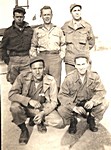
Daddy (front left)
|

Daddy by fence
|
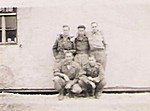
Group by wall
|
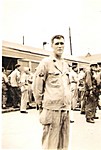
Standing by group
|
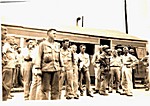
Group
|

Two men by fence
|

By windows
|
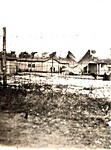
Fence and barracks
|
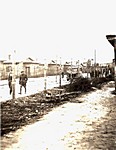
Fence
|
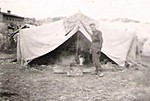
In front of tent
|

Shed and tents in back
|
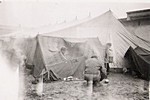
Tents
|

Men cooking
|
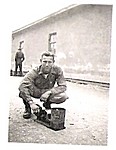
Daddy with stove
|
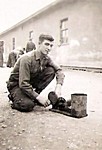
Cigarette and stove
|
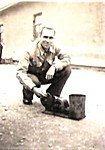
With stove
|
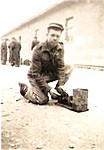
With stove
|
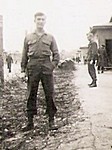
Man on road
|

Road
|

Liberated
|
 Source: Source:
- E-mails by Lynn Sewell, USA, to Moosburg Online, June 2009
|



